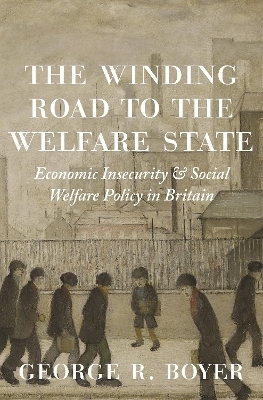
The Winding Road to the Welfare State
Economic Insecurity and Social Welfare Policy in Britain
Seiten
2021
Princeton University Press (Verlag)
978-0-691-21711-6 (ISBN)
Princeton University Press (Verlag)
978-0-691-21711-6 (ISBN)
How did Britain transform itself from a nation of workhouses to one that became a model for the modern welfare state? The Winding Road to the Welfare State investigates the evolution of living standards and welfare policies in Britain from the 1830s to 1950 and provides insights into how British working-class households coped with economic insecurity. George Boyer examines the retrenchment in Victorian poor relief, the Liberal Welfare Reforms, and the beginnings of the postwar welfare state, and he describes how workers altered spending and saving methods based on changing government policies.
From the cutting back of the Poor Law after 1834 to Parliament’s abrupt about-face in 1906 with the adoption of the Liberal Welfare Reforms, Boyer offers new explanations for oscillations in Britain’s social policies and how these shaped worker well-being. The Poor Law’s increasing stinginess led skilled manual workers to adopt self-help strategies, but this was not a feasible option for low-skilled workers, many of whom continued to rely on the Poor Law into old age. In contrast, the Liberal Welfare Reforms were a major watershed, marking the end of seven decades of declining support for the needy. Concluding with the Beveridge Report and Labour’s social policies in the late 1940s, Boyer shows how the Liberal Welfare Reforms laid the foundations for a national social safety net.
A sweeping look at economic pressures after the Industrial Revolution, The Winding Road to the Welfare State illustrates how British welfare policy waxed and waned over the course of a century.
From the cutting back of the Poor Law after 1834 to Parliament’s abrupt about-face in 1906 with the adoption of the Liberal Welfare Reforms, Boyer offers new explanations for oscillations in Britain’s social policies and how these shaped worker well-being. The Poor Law’s increasing stinginess led skilled manual workers to adopt self-help strategies, but this was not a feasible option for low-skilled workers, many of whom continued to rely on the Poor Law into old age. In contrast, the Liberal Welfare Reforms were a major watershed, marking the end of seven decades of declining support for the needy. Concluding with the Beveridge Report and Labour’s social policies in the late 1940s, Boyer shows how the Liberal Welfare Reforms laid the foundations for a national social safety net.
A sweeping look at economic pressures after the Industrial Revolution, The Winding Road to the Welfare State illustrates how British welfare policy waxed and waned over the course of a century.
George R. Boyer is professor of economics and international and comparative labor at Cornell University. He is the author of An Economic History of the English Poor Law, 1750–1850.
| Erscheinungsdatum | 08.04.2021 |
|---|---|
| Reihe/Serie | The Princeton Economic History of the Western World |
| Zusatzinfo | 13 b/w illus. |
| Verlagsort | New Jersey |
| Sprache | englisch |
| Maße | 156 x 235 mm |
| Themenwelt | Geschichte ► Teilgebiete der Geschichte ► Wirtschaftsgeschichte |
| Wirtschaft ► Volkswirtschaftslehre ► Makroökonomie | |
| ISBN-10 | 0-691-21711-4 / 0691217114 |
| ISBN-13 | 978-0-691-21711-6 / 9780691217116 |
| Zustand | Neuware |
| Informationen gemäß Produktsicherheitsverordnung (GPSR) | |
| Haben Sie eine Frage zum Produkt? |
Mehr entdecken
aus dem Bereich
aus dem Bereich
Macht und Herrschaft im Zarenreich
Buch | Hardcover (2024)
C.H.Beck (Verlag)
49,90 €
wie die USA und China um die technologische Vorherrschaft auf der …
Buch | Hardcover (2023)
Rowohlt (Verlag)
30,00 €


